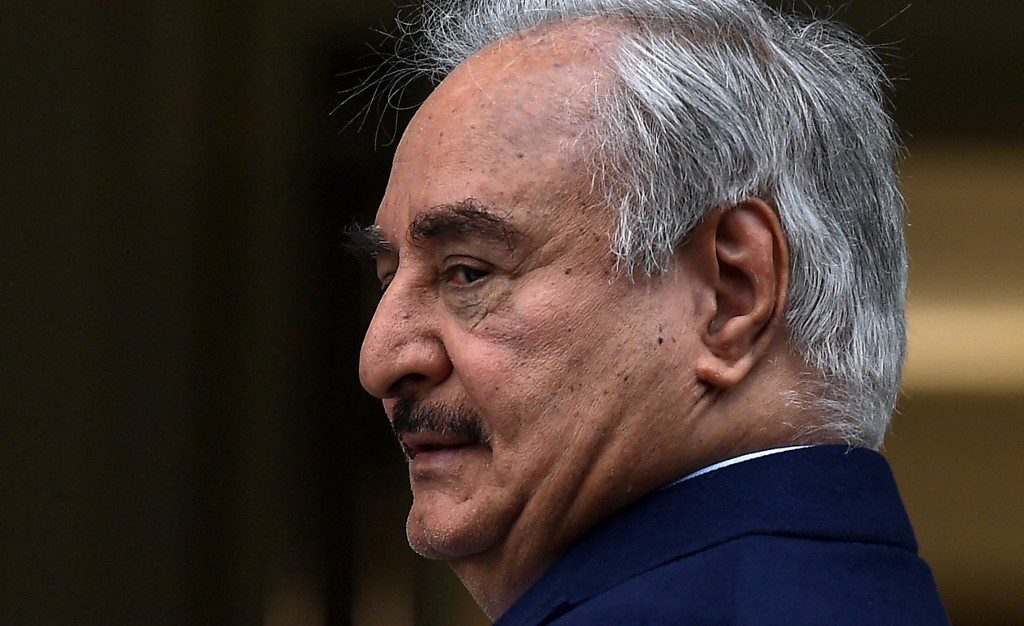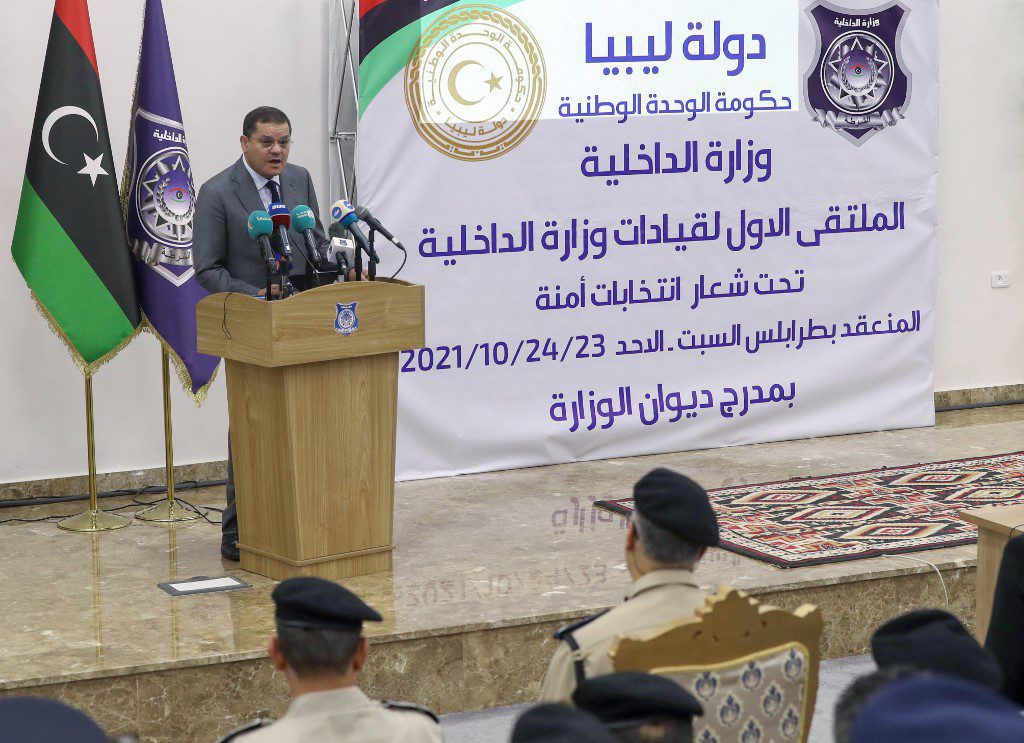
Khaled Mahmoud
Will Khalifa Haftar give up his American citizenship to run for the upcoming presidential elections in Libya? The answer to the question is essential for deciding the fate of the most likely candidate from his supporters’ point of view to win the elections scheduled before the end of 2021.
The question here concerns the strongman in eastern Libya, Field Marshal Khalifa Haftar, who recently gave up his position as commander-in-chief of the National Army stationed in eastern Libya temporarily, in preparation for the upcoming presidential elections, despite the likelihood of postponing the elections.
Despite threats of prosecution and accountability in a US court for war crimes, Field Marshal Haftar appears to be on his way to relinquish his US citizenship, which he has held for more than 27 years.
According to what one of Haftar’s aides said, he is about to officially announce his candidacy for the presidential elections and relinquish US citizenship. The presidential election law recently approved by the Libyan House of Representatives requires that the candidate does not hold any foreign citizenship.
But the matter is not that easy. According to a source, who demanded to remain unidentified, says: “We are not concerned about the developments of the alleged case in American courts. American law will not be able to force Haftar to appear before it for a malicious falsehood” as he put it.
He added that the lawsuit objective is to remove Haftar from potential candidates in the upcoming presidential elections.
According to this logic, Haftar is awaiting an announcement from the Election Commission regarding setting a date for the presidential elections candidacy to register his file. On the other hand, the Commission denied rumours of setting next week as a date for this purpose.
Election Controversy
The parliament approved the necessary legislation to organize the presidential elections with a law that includes 77 articles clarifying the president authorities and the conditions and procedures for candidacy and voting.
Article 12 of the law allows the candidate, whether civilian or military, to return to his position if he loses the elections, which is considered specifically tailored for Haftar, who complied with one of the articles that stipulated “The candidate must stop working and carrying out his duties three months prior the election date”, after he assigned his most prominent assistants and the Chief of Staff of the Army, Lieutenant-General Abdel-Razzaq al-Nadori, to temporarily assume the position of Commander-in-Chief of the National Army.
Conditions for the Next President
Article 10 stipulates that who runs for office shouldn’t hold another citizenship, be married to a non-Libyan, and be medically fit to carry out the duties of the presidency. In addition, he should submit a declaration of his family’s immovable and movable properties, inside and outside Libya.
It also stipulates that the age of the candidate on the day of candidacy shall not be less than forty Gregorian years, that he has at least a university degree or its equivalent from an accredited university, that he enjoys his civil rights, and that he has not been finally convicted of a felony or a crime against honour or trust.
To accept candidacy for the presidency, the candidate must submit a recommendation from a number of no less than five thousand registered voters.
Dbeibeh’s War

Haftar, who previously lived in Virginia, is currently facing accusations in the US of violating human rights and being involved in war crimes against humanity. But he is also necessarily facing a public war waged by Abdul Hamid Dbeibeh, head of the interim Government of National Unity and the Minister of Defence, and Khalid al-Mishri, president of the High Council of State in the capital, Tripoli, and one of the most prominent leaders of the Muslim Brotherhood.
As Minister of Defence, Dbeibeh asked the Libyan embassy in the US, and Najla Mangoush, Minister of Foreign Affairs in the Unity Government, to submit an official memorandum and request a criminal investigation within the American jurisdictions against Haftar, as he was involved in forging a memorandum from the Ministry of Defence that refuses to link him to charges under Libyan military law.
In his letter to Mangoush, Dbeibeh said that the memorandum submitted by attorney Lindsay Casson to the Virginia Federal Court on behalf of his client Haftar was forged and was not issued by the Ministry of Defence in the Unity government and considered it a crime punishable by Libyan and American laws.
Al-Mishri Joins the Fray
Almost the same stance was taken by Khalid al-Mishri, head of the State High Council loyal to the Dbeibeh government, as he sent an official letter signed by him to the US court, in which he denied the possibility of Field Marshal Haftar being held accountable according to the Libyan military law in the event of him being tried.
According to the text of al-Mishri’s message, Haftar will not be subject to the death penalty in Libya if he is interrogated before the American court, in an additional denial of a legal memorandum submitted by Haftar’s defence in particular.
The Lawsuit Origin
During the past year, two Libyan families filed a civil lawsuit in a federal court against Haftar, accusing him of war crimes, human rights violations and torture from 2016 to 2017.
The lawsuit filed in eastern Virginia demands compensation from Haftar, who, after his defection from the late Colonel Muammar Gaddafi’s regime, moved to the United States during the eighties and spent more than 25 years in northern Virginia, where he owns extensive properties there, but he faces charges in several federal lawsuits of murder and torture.
The lawsuits claim that civilians were indiscriminately killed during Haftar’s military campaigns and claim that he and his family bought 17 properties in Virginia between 2014 and 2017 and paid $8 million in cash.
US District Judge Leonie Brinkema again rejected Haftar’s excuse and set October 28, 2021, as the deadline for submitting the statement, giving Haftar a maximum of two weeks to make his statement.
Leonie had rejected Haftar’s immunity allegations and allowed the case to proceed, but she had dismissed Haftar’s two sons, Saddam and Khalid, as battalion commanders in the Libyan National Army. Noting that during the past month, she objected to Haftar’s request to cancel the lawsuits accusing him of committing war atrocities, as she allowed charges to be brought against him in return.
On what is Haftar’s Defence Based?
In court papers, Haftar’s lawyers said that asking him to answer questions would force him to violate Libyan law by revealing state secrets and exposing him to the death penalty.
One of the arguments put forward by Haftar’s lawyers is that the issue is political, and it is not appropriate for judicial review, and that allowing a judge to express an opinion on whether Haftar has committed war crimes interferes with the executive branch’s ability to conduct foreign policy.
Previously, Brinkema had ordered a 60-day stay of the case and sought the State Department’s opinion on whether allowing the prosecution to proceed would interfere with diplomatic efforts.
Although the American judge acknowledged the logistical difficulties and predicted that it would take years, the case would move to another stage, which could theoretically allow for interrogating Haftar under oath, who continues to deny information widely circulated by his enemies that he worked with the CIA during his time in exile.
In the absence of Libyan parties’ consensus on a constitutional rule regulating the conduct of the presidential elections, the possibility of postponing the elections remains. Perhaps, it should be treated as another possible news that is delayed until further notice.


